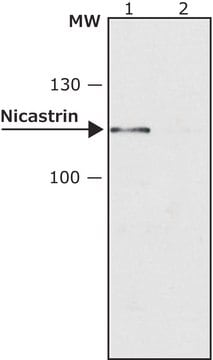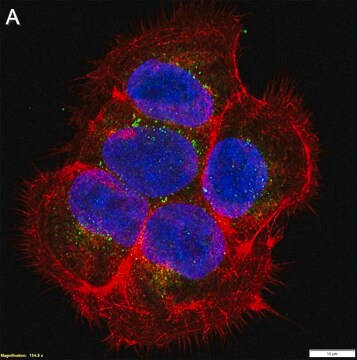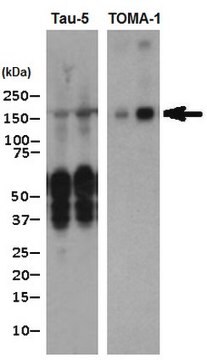MAB1563
Anti-Presenilin-1 Antibody, NT, clone hPS1-NT
culture supernatant, clone hPS1-NT, Chemicon®
Sinónimos:
Anti-ACNINV3, Anti-FAD, Anti-PS-1, Anti-PS1, Anti-S182
About This Item
Productos recomendados
biological source
rat
Quality Level
antibody form
culture supernatant
antibody product type
primary antibodies
clone
hPS1-NT, monoclonal
species reactivity
human
manufacturer/tradename
Chemicon®
technique(s)
ELISA: suitable
immunohistochemistry: suitable
immunoprecipitation (IP): suitable
western blot: suitable
isotype
IgG2a
NCBI accession no.
UniProt accession no.
shipped in
wet ice
target post-translational modification
unmodified
Gene Information
human ... PSEN1(5663)
Specificity
Immunogen
Application
Immunoblotting: 1:250-1:500. Recommend blocking buffer is TBS containing 5% non fat milk and 0.01% Tween 20. It is recommended that you also dilute the antibody in this blocking buffer. Incubate with the MAB1563 for 1 to 2 hours at room temperature or overnight at 4°C.
Immunoprecipitation
ELISA
Optimal working dilutions must be determined by end user.
Neuroscience
Neurodegenerative Diseases
Target description
Physical form
Storage and Stability
Analysis Note
Brain tissue
Other Notes
Legal Information
Disclaimer
¿No encuentra el producto adecuado?
Pruebe nuestro Herramienta de selección de productos.
Optional
Storage Class
10 - Combustible liquids
wgk_germany
WGK 1
flash_point_f
Not applicable
flash_point_c
Not applicable
Certificados de análisis (COA)
Busque Certificados de análisis (COA) introduciendo el número de lote del producto. Los números de lote se encuentran en la etiqueta del producto después de las palabras «Lot» o «Batch»
¿Ya tiene este producto?
Encuentre la documentación para los productos que ha comprado recientemente en la Biblioteca de documentos.
Nuestro equipo de científicos tiene experiencia en todas las áreas de investigación: Ciencias de la vida, Ciencia de los materiales, Síntesis química, Cromatografía, Analítica y muchas otras.
Póngase en contacto con el Servicio técnico







